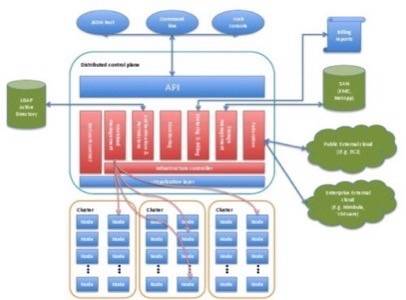Nimbula emerged from stealth today, and as you might expect with co-founders who developed the Amazon EC2 cloud service, it’s poised to be a pretty dig deal. The new project of Chris Pinkham and Willem van Billjon, Nimbula merges the technology of the public cloud – with all its efficiency and scalability – with the security and control of the private data center.

And with such luminaries on board, it’s no surprise that the startup seems to be tackling some of the key challenges associated with enterprise cloud adoption: questions of private versus public clouds, security, and interoperability.
Challenging the Public/Private Cloud Dichotomy
Recognizing the necessity for both public and private clouds, Nimbula seeks to make the two coexist more easily and hopes to disrupt the perceived dichotomy between the spheres. “Our solution allows customers to combine the operational efficiencies of the public cloud with the control, security, and trust of today’s most advanced data centers,” says CEO and co-founder Pinkham.
Nimbula plans to make this combination seamless and fluid and supports private data centers that can make metered bursts to public clouds like EC2 during peak times or for specific applications. In this way, Nimbula wants to avoid some of the bottlenecks and siloing associated with private clouds, and also hopes to bring the easy accessibility of AWS-like services to the private cloud.
But as Nimbula are targeting industries like finance and health, it’s clear that this agile move between public and private is undertaken with privacy, security, and regulatory compliance in mind.
Security in the Cloud
Nimbula offer a robust authentication system, with a finely-tuned policy-based authorization. Identity is granular, with control over not just who has access, but what parts of a server and what systems a user has access to.
The Question of Interoperability: A Cloud Computing Operating System
Nimbula Director, the company’s product, is an operating system for the cloud, addressing questions of security, reliability, flexibility, scalability, and ease of use. Nimbula offers an API, a command line and a web control panel in order to control all the cloud resources.
According to Pinkham, Nimbula and a cloud OS will “redefine operating systems and what they do for us.” In the cloud environment, he adds, an operating system does more than merely control one machine. It’s about managing cloud resources, machines, and users. With a cloud OS, Nimbula seeks to addresses one of the major drawbacks to the current state of cloud computing: interoperability.
Nimbula is in currently in beta, with a formal launch planned for the fall. The startup has been operating in stealth since 2009 and has received investment from Sequoia Capital and VMWare.






















